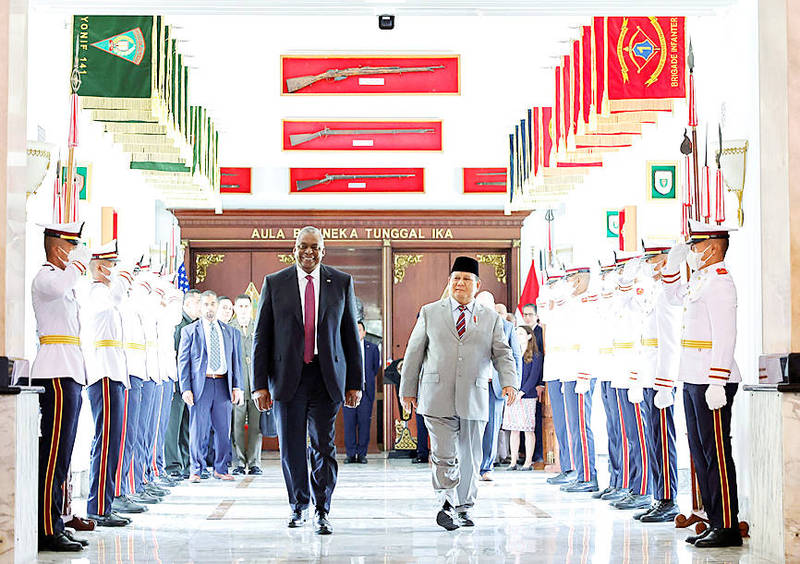US Secretary of Defense Lloyd Austin, center left, talks with Indonesian Minister of Defense Prabowo Subianto, center right, as they leave the venue of a joint news conference in Jakarta on Monday. Photo: REUTERS
LESSONS FROM RUSSIA: China remains a 'challenge,' the defense secretary said, after Biden-Xi talks last week sought to stabilize the US-China relationship
Bloomberg
China has noted the international response to Russia's invasion of Ukraine and could take steps to protect itself from a similar rebuke stemming from a more aggressive posture toward Taiwan, US Secretary of Defense Lloyd Austin said on Wednesday.
“You have to believe that they're thinking along those lines, if they were considering doing something in the future,” Austin told reporters shortly after he left Cambodia, where he attended a series of meetings with ASEAN defense ministers.
He said he had not “seen any physical signs of them insulating themselves.”
Asked if he anticipated Pacific Rim nations would rally to Taiwan's side if China were to launch an invasion, Austin said allies' respect for the rules-based international order "will lead them in whatever direction they go in, and not just allegiance to the United States."
US President Joe Biden has said Washington would defend Taiwan militarily from a Chinese attack — remarks that prompted Beijing to increase pressure on Taiwan following a visit to Taipei by US House of Representatives Speaker Nancy Pelosi in August.
Biden and Chinese President Xi Jinping (Xi Jinping) in Indonesia last week held their first in-person meeting since Biden assumed office, a session aimed at putting the US-China relationship on a more stable footing.
Still, China remains a “challenge” for the US and is likely already working to safeguard its economy and supply chains against sanctions allies would impose if it tries to invade Taiwan.
"China is our basic challenge. We don't call them a threat, we call them a challenge. That's the relationship that we believe we have," Austin said. "We have a competitive relationship and not a contentious relationship."
Austin met with Chinese Minister of National Defense General Wei Fenghe (魏凤和) in Siem Reap, Cambodia, on Tuesday, the first face-to-face meeting between the two since Pelosi's visit to Taipei.
The Pentagon chief called for the two sides to keep their lines of communication open and warned of “increasingly dangerous behavior” by Chinese military aircraft in the Indo-Pacific region, according to a statement and briefing by US officials after the meeting.
US forces are “spending a lot more time” training in Asia, for military exercises such as Garuda Shield, Austin said.
“Our troops want to train with allies and partners. They want to develop interoperability,” he said.
Austin described his meetings with officials from China, India, the Philippines and other nations on the sidelines of the ASEAN gathering as “very productive.”
“This is a big area, a vast area and it supports a lot of commerce,” he said. “We want to make sure that the skies and seas remain open and accessible to everybody in the region and around the globe.”
News source: TAIPEI TIMES
Chinese Minister of National Defense General Wei Fenghe, center right, talks with US Secretary of Defense Lloyd Austin, left, in Singapore on June 11. Photo: AP
US Secretary of Defense Lloyd Austin, center, walks at Siem Reap International Airport in Siem Reap on November 23, 2022, as he leaves Cambodia following a defense ministers' conference. Photo: AFP
